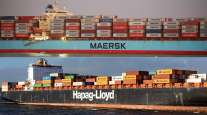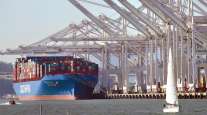Maersk CEO Soren Skou Predicts ‘Sharp’ Rebound After Coronavirus Peaks

[Stay on top of transportation news: Get TTNews in your inbox.]
A.P. Moller-Maersk A/S, the world’s largest container shipping company, is positioning itself for a strong rebound in two months, based on an expectation that the fallout of the coronavirus on global trade may soon peak.
“Over the last 2½ weeks, we have seen a steady decline in the number of new cases, [and] that is positive,” CEO Soren Skou said in an interview with Bloomberg Television’s Matthew Miller on Feb. 20, after the company published a weaker-than-expected fourth-quarter report.
“It means, very well, we could be set for a peak within the next two weeks,” he said. “If that were to be the case, then we would expect a very weak March and a rebound in April, a sharp rebound in April,” he said. “But there is still a lot of uncertainties out there.”
Investors seemed unsure how to interpret the overall message. Shares in the company opened down but then jumped about 4%, before sinking about 4% by midafternoon local time.
In part two of a two-part exploration of autonomous technology today, our latest RoadSigns podcast revisits conversations with Chuck Price of TuSimple and Ognen Stojanovski of Pronto.ai. Hear them discuss a palatable Level 2 version of trucking autonomy. Listen to a snippet above, and to hear the full episode, go to RoadSigns.TTNews.com.
The comments followed a set of results that lagged analyst estimates, and Maersk warned investors that its 2020 outlook is overshadowed by “considerable uncertainties” due to the outbreak of the coronavirus.
The Copenhagen, Denmark-based company expects its earnings before interest, taxes, depreciation and amortization, or Ebitda, to reach about $5.5 billion this year, less than the $5.94 billion estimated by analysts. Maersk acknowledged it was seeing a “weak start to the year.”
Skou said that Maersk has had to cancel more than 50 departures from China in the past two weeks. Looking forward, he said, “A lot will depend on what happens with the virus in the next few weeks.”
Frode Morkedal, managing director of equity research at Clarksons Platou Securities AS, said, “The bottom line is, that while the reported figures and guidance are slightly below consensus expectations, we believe there has been a growing fear that container exports from China might be significantly disrupted for longer, hence the guidance could be viewed as relatively optimistic, we argue.”
Jyske Bank analyst Morten Holm Enggaard said in a note. “The guidance was weak, but it may be due to Maersk including a bigger effect from the coronavirus than the market estimates.”
Skou told reporters he wouldn’t quantify the effect of the virus on Maersk’s guidance and said it’s difficult to estimate the impact.
“I really wish we didn’t have to provide a guidance,” he said. Maersk didn’t actually settle on its 2020 Ebitda forecast until the day before publishing its report, he said.
In 2019, Ebitda reached $5.71 billion, just shy of the $5.78 billion analysts had predicted.
The coronavirus adds to a litany of challenges for the container shipping industry, which already is grappling with the fallout of U.S.-China trade tensions as well as persistent oversupply.
Since its outbreak, the coronavirus has disrupted global supply chains and hurt shipowners, as China grows into the maritime industry’s main source of cargo with 90% of all global trade moving by sea.
Maersk said it expects global seaborne container growth to be 1-3% in 2020 compared with 1.4% in 2019. The company expects its own growth rate to be in line “or slightly lower” than the market.
The ocean shipper also listed new low-sulfur fuel that the industry has been forced to use from last month as an uncertainty that could impact bunker fuel prices and freight rates in 2020. It noted “weaker macroeconomic conditions” as an external uncertainty factor.
Maersk, which operates a fifth of the world’s container fleet, has in recent years tried to reduce its reliance on seaborne shipping.
On Feb. 19, the company said it agreed to buy U.S. warehousing and distribution company Performance Team as part of its strategy to expand land-based transport services. The deal is valued at $545 million.
The Maersk Group ranks No. 4 on the Transport Topics list of the Top 50 global freight carriers. Performance Team ranks No. 36 on the Transport Topics Top 50 list of the largest logistics companies in North America.
Want more news? Listen to today's daily briefing:





